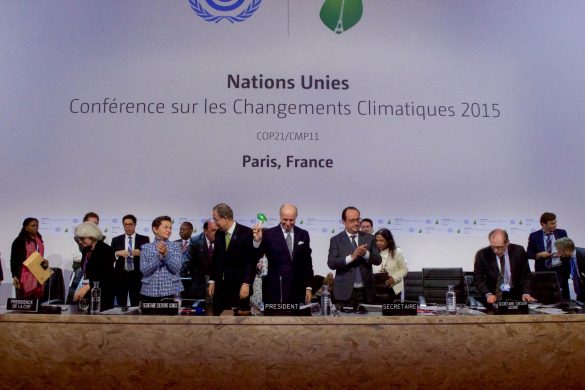Paris-aftalen indeholder et mål om at holde temperaturstigningen under 2 grader celsius i dette århundrede med en tilføjelse om at stræbe efter en grænse på 1,5 grader.
Til det formål har verdens nationer sendt frivillige bidrag i form af løfter til FN’s Klimasekretariat.
Så langt, så godt. Desværre er landenes mål langt fra nok til at forhindre en katastrofal stigning i temperaturen, lyder det i den årlige opgørelse fra FN’s Miljøprogram (UNEP).
Temperaturstigning på mindst tre grader
The Emission Gab kaldes opgørelsen, som har beregnet, at nationernes indsats med stor sandsynlighed vil føre til en stigning på mindst 3 grader.
Og det udelukkende, hvis alle nationer følger deres løfter til punkt og prikke, og USA ikke forlader den globale klimaaftale, som præsident Donald Trump har bebudet er hensigten. Ellers ser det endnu værre ud.
Der er altså et stort gab mellem mål og midler i den internationale klimaindsats.
Investering i ny teknologi
Rapportens forfattere har dog også haft de konstruktive briller på.
Investering i ny teknologi i forskellige sektorer kan skære betydeligt i de globale udledninger af de skadelige gasser. Rapporten nævner specifikt landbrug, bygninger, energi, skovbrug, industri og transport.
Investeringer kan falde på ganske få områder, lyder det. Her bliver sol- og vindenergi, effektive apparater, effektive biler samt et stop for afskovning nævnt.
Det næste store klimatræf er lige om hjørnet. Det starter d. 6. november. Bonn lægger lokaler til, men Fiji er præsident for konferencen. Der er forhåbninger om, at den klimatruede stillehavsnation vil arbejde ihærdigt for et ambitiøst resultat af den 23. runde af FN’s klimaforhandlinger.
Pressemeddelelsen fra UN Environment og rapporten kan hentes via nedenstående link.
Reaktioner
Den norske leder af FN’s Miljøprogram, Erik Solheim, har følgende at sige i forbindelse med offentliggørelse af rapporten:
“One year after the Paris Agreement entered into force, we still find ourselves in a situation where we are not doing nearly enough to save hundreds of millions of people from a miserable future. This is unacceptable. If we invest in the right technologies, ensuring that the private sector is involved, we can still meet the promise we made to our children to protect their future. But we have to get on the case now.”
Her er nogle reaktioner fra det internationale civilsamfund:
Camilla Born, Senior Policy Advisor, Climate Diplomacy at E3G
“Our opportunity to close the emissions gap has never been so urgent, nor so possible. With every day, climate impacts are becoming more real, while climate action becomes more affordable and beneficial for citizens everywhere. At COP23 governments should set their sights on enhanced ambition, embracing the 2018 facilitative dialogue as the best opportunity to open the tool shed and begin building more ambitious climate plans before 2020.”
Li Shuo, Senior Climate and Energy Policy Officer at Greenpeace China
“In light of the time pressure the world is faced with, there is an urgent need for countries to reassess how they can increase their efforts to reduce emissions. Overachievements of previous targets are an encouraging sign that governments can go much further, much faster in their climate ambition than previously anticipated. And so it is crucial that they use the upcoming negotiations in Bonn to work out not whether, but how they can raise their emission reduction targets in a way that capitalizes on the most cost-effective opportunities.”
Stephanie Pfeifer, CEO of the Institutional Investors Group on Climate Change (145 pension funds and asset managers across 11 European countries with over €21 Trn AUM)
“This report highlights once again that there is no time to waste when it comes to achieving the emissions reductions needed to secure a smooth transition to a low carbon economy at the lowest possible cost and realise the goal of staying well below 2°C. This was recognised by 190 countries in the Paris Agreement, and has been followed by a rapid shift within the financial community – climate change is now a recognised market risk that no serious investor can afford to ignore.
“The gap between the reductions needed and the national pledges made in Paris remains alarmingly high. At COP23 it is vital that governments accelerate action to deliver swiftly on their national commitments and make well-informed decisions to pursue greater longer term national ambition. In particular, every signatory across the G20 must adopt unequivocal policies that drive better disclosure of climate risk, curb fossil fuel subsidies and put in place strong pricing signals to catalyse the pace and scale of private sector investment required to transform key sectors including power generation, transport and real estate.”















